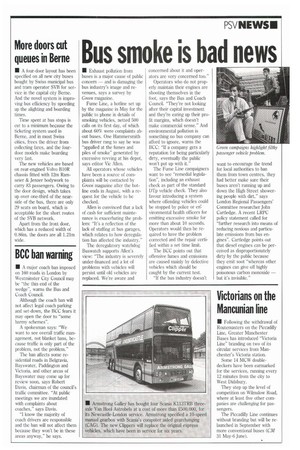Bus smoke is bad news
Page 21

If you've noticed an error in this article please click here to report it so we can fix it.
• Exhaust pollution from buses is a major cause of public concern — and is damaging the bus industry's image and revenues, says a survey by Green magazine.
Fume Line, a hotline set up by the magazine in May for the public to phone in details of smoking vehicles, netted 500 calls on its first day, of which about 60% were complaints about buses. One Hammersmith bus driver rang to say he was "appalled at the fumes and piles of smoke" generated by excessive revving at his depot, says editor Vic Alien.
All operators whose vehicles have been a source of complaints will be contacted by Green magazine after the hotline ends in August, with a request for the vehicle to be checked.
Allen is convinced that a lack of cash for sufficient maintenance is exacerbating the problem: "It's a reflection of the lack of staffing at bus garages, which relates to how deregulation has affected the industry."
The deregulatory watchdog Buswatch supports Allen's view: "The industry is severely under-financed and a lot of problems with vehicles will persist until old vehicles are replaced. We're aware and concerned about it and operators are very concerned too."
Operators who do not properly maintain their engines are shooting themselves in the foot, says the Bus and Coach Council. "They're not looking after their capital investment and they're eating up their profit margins, which doesn't make commercial sense." And environmental pollution is something no bus company can afford to ignore, warns the BCC: "If a company gets a reputation for being particularly dirty, eventually the public won't put up with it."
The Fume Line campaigners want to see "remedial legislation", including an exhaust check as part of the standard DTp vehicle check. They also favour introducing a system where offending vehicles could be stopped by police or eiivironmental health officers for emitting excessive smoke for more than about 10 seconds. Operators would then be required to have the problem corrected and the repair certified within a set time limit.
The BCC points out that offensive fumes and emissions are caused mainly by defective vehicles which should be caught by the current test.
"If the bus industry doesn't want to encourage the trend for local authorities to ban them from town centres, they had better make sure their buses aren't running up and down the High Street showering people with dirt," says London Regional Passengers' Committee researcher John Cartledge. A recent LRPC policy statement called for "further research into means of reducing noxious and particulate emissions from bus engines". Cartledge points out that diesel engines can be perceived as disproportionately dirty by the public because they emit soot "whereas other engines can give off highly poisonous carbon monoxide — but it's invisible."




















































































































